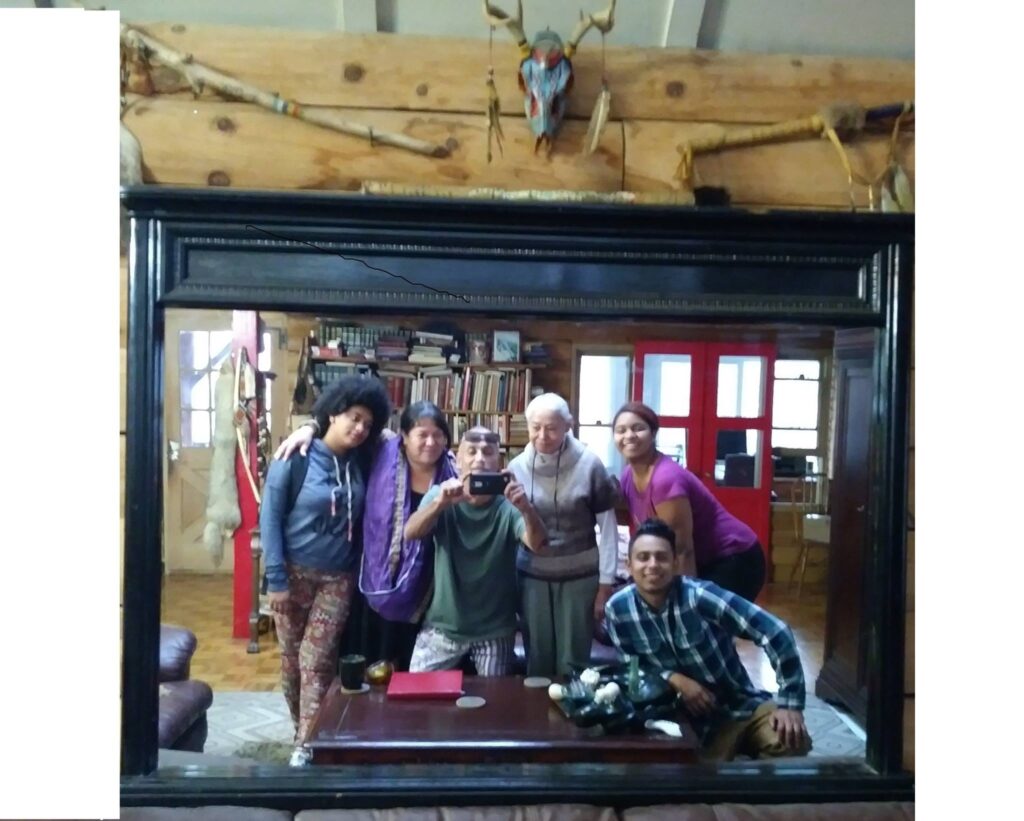Oakland, Berkeley and San Francisco sit in the territory of Huichin, part of the stolen land of the Chochenyo Muwekma Ohlone, the successors of the historic and sovereign Verona Band of Alameda County. Ohlone people are not federally recognized as indigenous nations in the San Francisco Bay Area by the federal colonial government. California Native Americans suffered a brutal history of colonization, diseases and heinous violence and servitude during the Gold Rush and California Missions era. In 1854 alone, the government spent 1.4 million – $5 a head, 50 cents a scalp for people who turned their professional careers into killing Native Californias.
We acknowledge the land, labor and continued fight of the Ohlone people. We recognize their continued fight to reclaimed their ancestral lands and culture, to assert their sovereignty, and to be recognized. We honor the Ohlone’s connect to this land and whose presence—past, present, and future—we respect. As the Village In Oakland fights for the rights of unhoused people to exists – including safe, adequate and dignifies housing on this stolen land, we acknowledge that the land we are working on today is the original homeland of Ohlone people.
Before we set off on this work, we asked for the blessing of Ohlone Elder Ann Marie Sayers, a Mutton/Ohlone, who was determined in August of 2011 by the California Native American Heritage Commission to be the “Most Likely Decendant” of the 6000 year old remains of an Ohlone child that were unearthed during the construction by KB Homeon the knoll just above Market Street Field.

Sayers lives at Indian Canyon, which is an area near Hollister her family originally lived at during the Mission era. Indian Canyon is the only recognized Californian Indian Country, which is a designation that entitles an area to be governed by tribal or federal law, as opposed to state law. At the time of the missions, Indian Canyon was safe from those who rounded up native americans to be put to work. As the attempted genocide of California Natives massively shrunk the populations during the Gold Rush, Indian Canyon served as a safe haven for those who were able to find it after passing through a swamp. Sayers, with the help of friends, reclaimed some of the original Indian Canyon property in 1988, which is now a sanctuary to many indigenous peoples world-wide who don’t have traditional lands for ceremonies.
In the Land of my Ancestors is a documentary short that celebrates the living legacy of Ann Marie Sayers. You can check out the documentary here
WHY LAND ACKNOWLEDGEMENTS ARE IMPORTANT
“We need truth in history. It’s so important. The foundation of this country was built on the lives and death of Indians.”
– Ann Marie Sayers
These acknowledgements can easily be a token gesture rather than a meaningful practice. All settlers, including those who recently arrived, have a responsibility to consider what it means to acknowledge the history and legacy of colonialism. We have a responsibility to understand that we have inherited particular privileges as settlers today because of colonialism. And if we truly stand for justice, we have the responsibility to understand how the work we do around homelessness and the unhoused relates to acknowledging stolen Ohlone land, and to be mindful about our intentions to disrupt and dismantle colonialism beyond this territory acknowledgement
SUPPORTING BEYOND THE ACKNOWLEDGEMENT
One very direct and material way to support beyond land acknowledgements is to contribute financial to any of these efforts working towards re-matriating the land and water to their rightful Indigenous stewards, and protecting Native American culture, which is intrinsically connected to the land.
1) Sogorea Te through the Shuumi Land Tax: http://sogoreate-landtrust.com/shuumi-land-tax
2) The West Berkeley Shellmound through the crowdrise campaign: https://www.crowdrise.com/save-the-west-berkeley-shellmound
3) The Run For Salmon: http://www.run4salmon.org/donations/1594
4) Indian Canyon: http://www.indiancanyonlife.org
We created this Land Acknowledment to not only pay respect to the rightful stewards, but also in the hopes of inspiring others to take action to support Indigenous communities, and to actively learn about the Indigenous people on whose land you currently live on, the history of this land, and for you to make a mindful commitment to be an ally to Native Americans in their fight for preserving culture, life and sovereignty.
